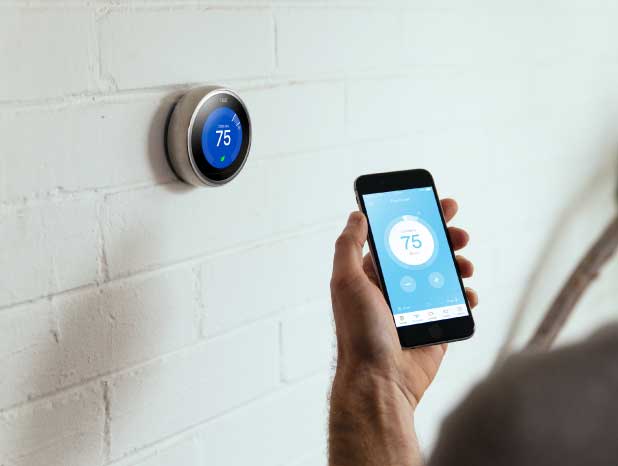
As artificial intelligence becomes a more prominent part of the industry, a smart home is no longer just one that can react to your voice commands or be controlled by a home automation app, but one that can do all that while learning how to better answer your questions, follow your commands, and predict based on your preferences.
Smart Home Artificial Intelligence Advancements
Smart home automation is changing as the capabilities of AI grow. If your home automation system utilizes a Nest Learning Thermostat or Vivint Element Thermostat, artificial intelligence is already part of your smart home, with your thermostat studying your daily routine and creating a schedule based on your preferences—all while saving you energy. If you take advantage of voice-activated, hands-free control with a personal assistant like the Amazon Echo, you may experience your home getting smarter very soon.
That’s because Amazon itself is working on AI chips for their full line of smart speakers, including the Echo and the Dot. These chips will allow Alexa, your virtual personal assistant, to answer your questions faster. The way Alexa currently works, the device doesn’t actually understand what you’re asking. Instead, it turns your question into data, then sends that data to the cloud, asking Amazon’s servers for an answer. Integrated chips will allow Alexa to understand and answer the question itself—all while learning what types of questions you ask and how you ask them.
Google is powering its own Google Assistant, available on newer Android phones and Google’s smart speakers, with WaveNet, developed by Google’s AI division, DeepMind. WaveNet improves text-to-speech, learning as it goes, to make conversing with your smart home more natural than ever. WaveNet’s neural network uses recordings of real speech to generate new waveforms rather than simply gluing together bits of pre-recorded speech, the way other text-to-speech devices do.
Smart Home Machine Learning Capabilities
Initially, these improvements will likely only decrease response time for simple queries like what the weather will be like that day, and how natural the device’s response sounds. But as the capabilities grow, artificial intelligence in home automation will change the game. You won’t need to remember to activate your home automation security system because your smart home will learn what times of the day your home is unoccupied and needs to be secured. Smart plugs will better regulate your energy use. You won’t have to program settings for room lighting, because your system will learn your preferences. The limits to how AI can be used to improve your home are determined only by the imagination of those creating new products.
Those limits are there, however. Many smart home devices are used to solve problems that humans already could. While it’s convenient to set a timer with your voice while cooking, it’s not essential. For AI to become a major part of everyone’s home, it must work quickly and solve problems that humans can’t. While a very advanced artificial intelligence home automation system isn’t here yet, we’re getting there, and the future of home automation and security is looking very promising.



